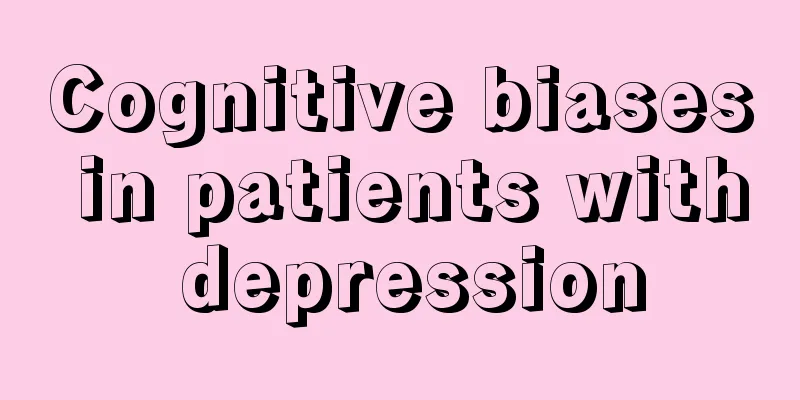Cognitive biases in patients with depression

|
Nowadays, people's pace of life is getting faster and faster, and with it comes the increasing pressure of life and work. Due to long-term work and lack of rest, many people suffer from depression. Depression is a relatively serious mental illness. During the illness, patients must receive timely treatment and their caregivers must also do a good job of related nursing work. So, what are the cognitive biases that people with depression have? 1. There is a bias in the attribution of depression Patients tend to attribute negative events to themselves, the whole, and lasting; and to attribute positive events to others, local, and temporary. This is significantly different from the attribution pattern of normal people. 2. Negative Self-Schema Everyone has a self-schema about themselves, the world around them, and the future. This schema often affects people's thinking, emotions, behavior, and other aspects. The self-schema of patients with depression has negative deviations, which is often formed during adolescence under the influence of some loss events such as death of parents, exclusion from peers, and criticism from teachers. They view everything around them negatively and tend to see themselves as "losers". Stress can easily activate this negative self-schema, leading to depressive episodes, which in turn reinforce this schema, leading to a vicious cycle. There are two essential negative self-schemas in patients with depression: dependency and self-blame. People with strong dependencies often feel the changes in their situation deeply when faced with stressful life events, leading to depressive episodes. For those individuals who often blame themselves, they often demand perfection from themselves and blame themselves for everything, so everything they have now means failure, which can also lead to depression. Normal people also have cognitive biases in their self-evaluation. When they do things well, they often overestimate their abilities, and when they do things poorly, they emphasize some external factors. This "optimistic" approach is very necessary for maintaining physical and mental health. Patients with depression are just the opposite. When things go well, they often emphasize some external factors, and when things go badly, they underestimate their own abilities, which often leads to illness. 3. Automatic thinking Negative automatic thinking manifests itself as numerous negative ideas and various systematic logical errors. Common logical errors include subjective assumptions, selective attention, over-extension, absolute thinking of either this or that, etc. However, most patients are not aware that they have these thoughts before they have unpleasant emotions, because these thoughts have become part of their way of thinking and affect their emotions, behaviors and other aspects, becoming one of the important characteristics of depression. 4. Negative coping styles Coping style plays an important role in the onset of depression. Depressed patients tend to use negative coping styles more often and less positive coping styles. |
<<: What's the matter with the red spots under the liquid
>>: The spit out is like rotten meat with blood
Recommend
Sores form on the buttocks after sitting for a long time
If you sit for too long, your buttocks will get s...
What are the main measures to prevent small cell lung cancer?
Small cell lung cancer requires daily prevention,...
Is long-term constipation a sign of colon cancer?
Long-term constipation itself does not mean that ...
What is the recurrence rate of colon cancer
What is the recurrence rate of colon cancer? The ...
Why is it that I can’t breathe?
Nowadays, in a society with such a fast pace, man...
Is it really good to drink boiled water before going to bed at night?
It is said that women are made of water. Our dail...
What is the cause of gastric antral vascular ectasia
At present, the clinical cause of gastric antral ...
What foods are good for patients with advanced liver cancer? What should be paid attention to in the diet of patients with advanced liver cancer?
For every patient who has reached the advanced st...
Can hyperthyroidism be cured?
The occurrence of hyperthyroidism is actually ver...
What causes lower back pain and frequent urination?
Low back pain can also cause symptoms of frequent...
See if your intestines are young
The intestine is an important immune organ in the...
Does breast cancer chemotherapy require hospitalization?
Does breast cancer chemotherapy require hospitali...
What should be paid attention to when caring for advanced lung cancer? Four important matters to pay attention to when caring for advanced lung cancer
Lung cancer does not require any special care in ...
Are cherries good for the eyes?
Cherry is a kind of fruit that people eat in dail...
What are the diagnosis and treatment methods for heart failure
When suffering from heart failure, you must pay a...









